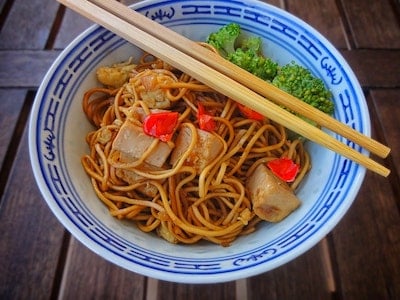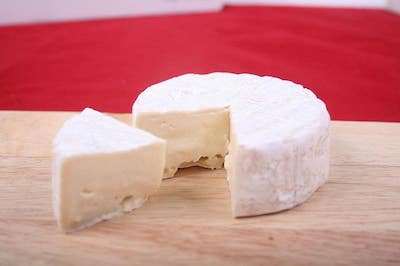Vegetarian Substitute for Shrimp Paste: What Can You Eat Instead?
There are many admirable reasons to avoid eating shrimp. It could be that you’re opposed to the unsustainable farming and fishing practices used to source these sea creatures.
It could also be that you are allergic to them. However, you might still want that distinct flavor from adding shrimp paste to your dish.
Unfortunately, vegetarian substitutes for shrimp paste can be challenging to find, as the taste is hard to match.
Not to worry, though, because products like miso, seaweed, and mushrooms make great alternatives.
Let’s look at what you can use as a vegetarian substitute for shrimp paste.
What Is a Good Vegetarian Substitute for Shrimp Paste?
Shrimp paste is an essential ingredient in Thai cooking. This product is often used to enhance the flavor of curries and sauces.
Unfortunately, it can be challenging to pin down a vegetarian substitute for shrimp paste when finding a workaround for dietary restrictions.
This is primarily because there aren’t many products that match the delicacy’s unique saltiness and umami flavor.
However, this doesn’t mean that there aren’t ingredients you can use in place of shrimp paste.
If you’re on a plant-based diet or can’t find the product, you can opt for items like miso or mushrooms.
You should look for an ingredient with a similar taste and texture profile.
Check out below some excellent vegetarian substitutes for shrimp paste.
Miso
Miso is a paste made from fermented soybean. This Japanese staple has been around for generations and adds saltiness and umami to the dish.
This flavor profile is why it works so great as a vegetarian substitute for shrimp paste.
There are numerous types of miso available. Some are fermented for a few weeks, while others take years to produce.
The lighter version of this product has a sweetness to it. Dark miso, on the other hand, is earthier and more intense.
Therefore, it works better as a vegetarian shrimp paste alternative.
You can use about two tablespoons of the ingredient in place of half a teaspoon of shrimp paste.
Seaweed
Seaweed has been used abundantly in Japanese and Korean dishes. This product is nutritious and provides the umami taste that you would get from shrimp paste.
The seaweed with the highest umami includes naga, rishi, kombu, and nori.
It would be best to use fresh seaweed, but this might not be possible if you don’t live by the ocean.
The dried version of the ingredient will work just as well, so don’t worry too much about this.
Add about two tablespoons of the plant product to replace half a tablespoon of shrimp paste.
Shiitake Mushrooms
When looking for vegetarian shrimp paste or even shrimp itself, mushrooms may do the trick.
Shiitake mushrooms are known for their umami flavor and are commonly used in savory dishes.
They’re typically grown in Japan, although they can also be found in other locations.
You can use fresh shiitake mushrooms as a vegetarian substitute for shrimp paste.
Dried mushrooms will also do the trick if you can’t find fresh ones in your area. They might be better because the umami quality increases when the mushroom is dried.
Finely chop the mushrooms and add them to your dish. For example, one cup of shiitake mushrooms will substitute for half a teaspoon of shrimp paste.
Another option would be to grind the ingredient. You can then use a 1:1 substitution ratio, which is less likely to throw off the texture profile of your meal.
Yellow Bean Sauce
Yellow bean sauce is made from fermented soybeans and is quite popular in Chinese cooking. No pantry in that corner of the world is complete without this ingredient.
It’s used in everything from vegetables to beef to chicken. In addition, this sauce has a robust earthy flavor that works great as a shrimp paste alternative.
You can directly substitute your yellow bean for shrimp paste using the exact quantities indicated in the recipe.
Tamari Sauce
This Japanese variant of soy sauce is commonly referred to as vegan fish sauce or shoyu. It’s made from brined fermented soybeans and koji, a type of fungus that has a distinct flavor.
Unlike regular soy sauce, tamari is low in sodium. It’s also gluten-free and doesn’t have the fishy taste that you would get from fish sauce.
Thanks to its rich umami flavor, tamari works excellent as a vegetarian substitute for shrimp paste.
Use one tablespoon of tamari sauce for one teaspoon of shrimp paste.
Black Bean Sauce
As the name suggests, black bean sauce is made from fermented black soybeans. It’s one of the most popular stir-fry ingredients and is commonly combined with garlic and chilies.
This sauce has a salty, intense flavor that makes it an excellent vegetarian substitute for shrimp paste in a 1:1 ratio.
However, black bean sauce is a wheat-based product containing gluten.
Soy Sauce
Unlike shrimp paste, soy sauce is readily available. It’s an affordable alternative with a milder taste than products like oyster sauce.
You can therefore use it generously without significantly affecting the dish’s flavor.
However, because of its dark color, using soy sauce could result in a dish that doesn’t look very appealing.
Soy sauce is made from fermented soybeans, wheat, salt, and water. That means that it contains gluten but is still suitable for vegans.
It has a long shelf-life and can be stored for longer than shrimp paste.
Soy sauce is rich in protein and has a strong umami flavor. Therefore, when using it in place of shrimp paste, a 1:1 ratio will suffice.
In Summary
Shrimp paste is a popular ingredient in Thai cooking. It enhances the taste and adds a depth of flavor to the meal.
Therefore, it can be challenging to substitute it, as there aren’t many plant-based products that can match its taste.
Fortunately, we’ve dug around and found great vegetarian substitutes for shrimp paste.
These umami-filled ingredients will provide a burst of flavor similar to what you would get from the humble sea creature.







